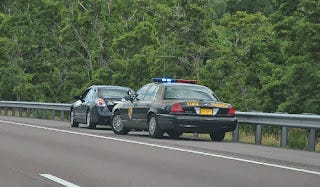Police can stop you if your third brake light is out calling it a "safety hazard to the public"

Police in Maryland can stop and interrogate a driver if he is driving a car with a burned out third brake light. The Court of Special Appeals ruled earlier this month that allowing the car to continue with only two functional brake lights would pose a safety hazard to the public.
The three-judge panel came to this conclusion in resolving the November 30, 2011 traffic stop of Marlon Smith in the city of Baltimore. Detective Kenneth Ramberg had been watching Smith as he walked on Darley Avenue, but he could not stop him because he was not engaged in any criminal behavior. Once Smith got in the passenger seat of a car with a broken rear deck brake light, Detective Ramberg pulled the car over.
The detective said he smelled marijuana and ordered both of its occupants out of the car. As he started looking inside the car, he spotted a handgun that belonged to Smith. Maryland does not allow citizens to carry a firearm except in rare circumstances. Smith appealed the firearms possession conviction, arguing the initial stop was invalid because state law only requires a vehicle to have two functioning brake lights.
"Every motor vehicle registered in this state and sold as a new vehicle after June 1, 1967, shall be equipped with at least two stop lamps," Maryland Code Section 22-206 states.
The court countered by citing a generic statute that allows an officer to issue an "equipment repair order" if a Maryland-registered vehicle does not meet state standards. The judges then cited Code of Maryland Regulations 11.14.02.10 which instructs state vehicle inspectors to fail cars made after 1985 if they do not have a functioning third brake light.
"Assuming arguendo that the traffic violation in this case was predicated solely on the Motor Vehicle Administration regulation, the stop was justified nonetheless on the basis that the vehicle was driven in an unsafe condition," Judge Irma S. Raker wrote for the court. "An officer is authorized to stop a vehicle that is being driven in an unsafe condition."
The court then cited research that claims the third brake light reduces rear-end collisions, and creating a condition that increases rear-end collisions is inherently unsafe.
"A study conducted by the NHTSA found that from 1986 to 1995, the high-mounted brake light reduced the frequency of rear impact accidents in every year the study was conducted," Raker wrote. "Therefore, even with two functioning rear brake lights, the specific safety advantages of the center high-mounted brake light demand that it function properly."
http://thenewspaper.com/rlc/docs/2013/md-thirdlight.pdf'
DOJ report: Police behavior during traffic and street stops 2011
Black drivers were more likely than white and Hispanic drivers to be pulled over by police in 2011 and were less likely to believe the police behaved properly during the encounter, according to a report released today by the Bureau of Justice Statistics (BJS).
The finding are based on the Police-Public Contact Survey (PPCS), which asked a national sample of residents age 16 or older about experiences with police during the prior 12 months.
http://www.bjs.gov/content/pub/pdf/pbtss11.pdf


